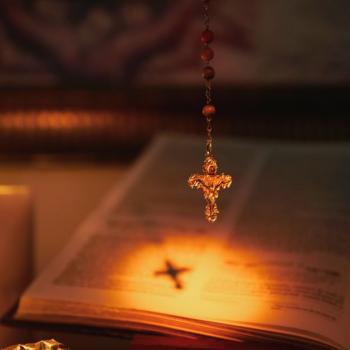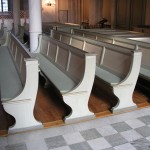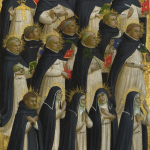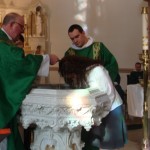Command the children of Israel, and say unto them, My offering, [and] my bread for my sacrifices made by fire, [for] a sweet savour unto me, shall ye observe to offer unto me in their due season.
And thou shalt say unto them, This [is] the offering made by fire which ye shall offer unto the LORD; two lambs of the first year without spot day by day, [for] a continual burnt offering.
The one lamb shalt thou offer in the morning, and the other lamb shalt thou offer at even; And a tenth [part] of an ephah of flour for a meat offering, mingled with the fourth [part] of an hin of beaten oil.
[It is] a continual burnt offering, which was ordained in mount Sinai for a sweet savour, a sacrifice made by fire unto the LORD.
As I mentioned yesterday in my Seven Quick Takes, I’m reading through the Bible as part of the The King and I project. The passage above is taken from Numbers 28:2-6, part of yesterday’s reading. So far, in my reading, the lengthy descriptions of the proper form of sacrifices are second in dullness only to the genealogical recitations. Unlike the ‘begats,’ the sacrifice laws are related to the practice of Judaism, not just its history, so they win out on interest.
But that leads me to a question: when did the Jews stop obeying all these highly detailed sacrifice laws? I grew up in very Jewish (if very secular) Long Island, and certainly no one there was making sin offerings or burning livestock.
The precise details of sacrifice have gotten a lot of attention in Exodus, Leviticus, and Numbers, so it’s hard for me to imagine how Jews would let these practices fall by the wayside, when they seem to be at the heart of the Pentateuch. Christians have an excuse, since the sacrifice of Jesus replaced that of the paschal lamb, but what prompted the Jews to abandon these laws?
Edited to add: It didn’t occur to me that these laws might still be followed in more orthodox communities, but then I remembered an article from the NYT about Orthodox Jews who swing live chickens over their heads and then slaughter them as a sin offering for Yom Kippur. Are these practices still common in highly observant communities?
Edited again to add: Commenters are suggesting that sacrifices could only be in the Temple which was most recently destroyed in 70 AD. So were sacrifices on hold between the destruction of the first Temple and the construction of the second? Why couldn’t Jews return to the mobile Tabernacle used in the desert? Did all Jews live close enough to the Temple that they could participate in ritual, or was their part in the covenant satisfied by the actions of others?
















